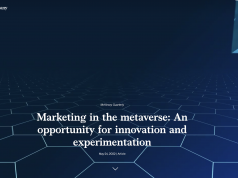Andrew Faridani December 21, 2021 Forbes
One of the biggest new platforms for marketing became very clear during the pandemic: metaverse marketing. For those not familiar with the actual term, metaverse is defined as an immersive, digital environment populated by virtual avatars representing actual people. Still not clear what it means? Think of the hit video game Fortnight, a virtual reality game where avatars play the game in real-time, fighting against each other and attending events that are held in that particular metaverse. Every person playing in real life has their own avatar, and plays in the game with their own, personalized digital representation.
What makes a metaverse a metaverse? Influencer Marketing Hub does a great job breaking down the components: a metaverse is always active, exists in real time, players have individual agency, it’s a self-contained and fully functioning universe and contains user-generated content.
Though other industries are creating and building metaverses, the gaming industry is the first to truly grasp, and take advantage of the potential. And the brands that are early adopters in realizing the potential of metaverses are the ones who will see the most return.
Why Brands Are Marketing In The Metaverse
There are many reasons why marketers are flocking to the metaverse. It’s new, and faster connections finally exist to support growing environments. But maybe the most important reason is marketers want to target and keep Millennials and Gen X up-to-date and engaged with their products and technologies, and metaverses allow them to target these audiences in a new way. And from the engagement brands are already getting, it’s clear this marketing strategy is working, and here to stay.








